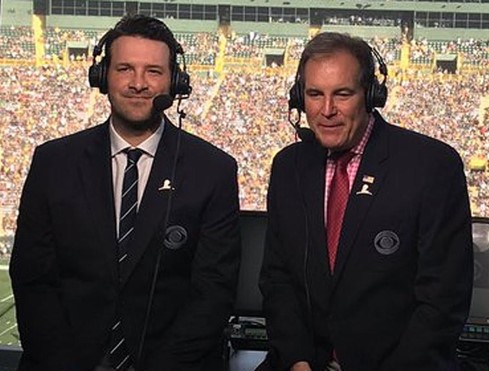
For a recent #TBT post, I featured a Mike Stern blog post all about Marie Kondo’s “tidying up” routine. And earlier this week, he submitted a guest post centered on Kondo and Romo.
It sounds like a morning show. Or a couple characters in a buddy movie. Or a reboot of The Odd Couple.
But alas, Marie Kondo and Tony Romo are none of those things. In fact, I’ll bet they’ve never met. But in Mike Stern’s world, they each provide an important tale for radio programmers and talent. And isn’t that what we’re here for?
Mike has the keen insight to look at what these two very diverse celebrities have been up to lately and draw important lessons. So whether you’re going to spend Sunday tidying up around the house or joining friends and family for the “Big Game,” hopefully this post will inspire you. And come to think of it, many of us may be doing both of these things. – FJ
By Mike Stern
The definition of regression is “to return to a former or less developed state.” And while that is generally not a good thing, it is possible for regression to lead to something that’s actually positive. That’s true for any profession or pastime – including the art of doing radio.
Recently, I’ve noticed two instances of regression, one good and one not so good and both relate directly to success (or the lack of it) in radio.
Good Regression: Marie Kondo
Marie Kondo burst into the world’s consciousness back in 2019 with her book The Life-Changing Magic of Tidying Up: The Japanese Art of Decluttering and Organizing. The book’s popularity led to a show on Netflix. where the charismatic author taught her system to people with too much stuff in their lives. At that time, her system for decluttering your life even became a verb, “Kondo-ing.”
Organizing. The book’s popularity led to a show on Netflix. where the charismatic author taught her system to people with too much stuff in their lives. At that time, her system for decluttering your life even became a verb, “Kondo-ing.”
At the time, my wife read the book and started taking the practice to heart. In between defending my boxes of old radio stuff (anyone have a DAT machine?) from getting Kondo-ed, I wrote a blog post about how her organization principles could be applied to radio at the station level.
Part of what made Marie Kondo’s system successful and popular is that it was somewhat draconian in nature. Every item in your home had to spark joy or it had to go. Once the culling was complete, there were many rigorous procedures for how to keep things organized.
Now, three years later, Marie Kondo has, in a sense, regressed.
She recently made a big splash with a post on her website following the birth of her third child. Since that momentous occasion, Kondo has “eased up on herself” when it comes to tidying. “I am busier than ever after having my third child, so I have grown to accept that I cannot tidy every day – and that is okay!” she now espouses. Then at a media event she added, “My home is messy, but the way I am spending my time is the right way for me at this stage of my life.”
Marie Kondo? A messy home?
While I stand by my suggestions from the original blog post, Kondo’s comments are very relatable for anyone trying to run a radio station today. Compared to 2019, nearly every Program Director is now being challenged to do more with less.
Add in the reality that managing an airstaff is very similar to having children. Now Kondo’s comments about accepting that everything can’t be tidy and spending time in meaningful ways is very relatable to programmers.
Here are a few thoughts on how Kondo’s enlightened philosophy applies to running a station in 2023:
- Children need attention: It’s been said before but I’ll say it again. Talent is the future of radio. Anyone can play Led Zeppelin and Nirvana. No one can duplicate a great talent. But managing an airstaff is a lot like having kids. Time spent coaching and nurturing your hosts will pay dividends. But that doesn’t make it a neat or tidy process.
- Kids (and DJ’s) should be messy: Too many hosts are afraid to open up and be creative on the air because they’ve been told to keep their breaks short…and tidy. This is not a license to talk endlessly, but talent should be encouraged to be a little messy now and again if it makes their content compelling.
- Messy can be charming: Look no further than Oscar Madison (of the aforementioned “Odd Couple”) or good old Pigpen from the “Peanuts” comic strip. Or
 John Belushi’s “Animal House” character. The fact is, slobs can be lovable, memorable, and even endearing.
John Belushi’s “Animal House” character. The fact is, slobs can be lovable, memorable, and even endearing. - Creativity is messy: Being a little “un-neat” can also apply to your station imaging and promotions. Do something new, interesting and attention-getting even the execution is a little messed up.
- Good rotations aren’t good enough: Too many PD still dedicate outsized amounts of time achieving a perfect music scheduling database. Yes, logical clock structure and solid rotations are important, but this is a place where it’s OK to sometimes be a little messy. After all, a music surprise or two can keep your audience engaged. After all, a perfect closet is boring.
So, I applaud Marie Kondo’s regression because it just might lead to a more human, accessible quality for your radio station.
But then there’s former Dallas Cowboy quarterback and star network color man, Tony Romo.
Bad Regression: Tony Romo
 NFL football games regularly attract some of the biggest audiences on television. The league is an 800 lb. gorilla when it comes to TV ratings which naturally leads to a lot of attention and criticism of the networks’ play by play and color commentators. Each week, Twitter, Reddit, fan groups, and other outlets are loaded with fan vitriol, often hurled squarely at the broadcasters who bring us the games.
NFL football games regularly attract some of the biggest audiences on television. The league is an 800 lb. gorilla when it comes to TV ratings which naturally leads to a lot of attention and criticism of the networks’ play by play and color commentators. Each week, Twitter, Reddit, fan groups, and other outlets are loaded with fan vitriol, often hurled squarely at the broadcasters who bring us the games.
For example, NBC’s team of Al Michaels and Tony Dungy were roundly criticized for a seemingly lifeless call on one of the year’s most exciting games, the Jacksonville Jaguar’s comeback win in the first round of the playoffs. Despite being a riveting contest – perhaps “a game for the ages” – many articles like this one in Sports Illustrated called out Michaels for a blasé call. And if you are interested, Michaels recently defended himself. You can read his comments here.
Suffice it to say, play-by-play sports commentating is a tough room. The bigger the stage, the more critical fans seem to become.
My personal axe to grind would be with Chris Collinsworth, part of the regular NBC Sunday Night Football team. To my ears, he’s gone from insightful to an incredibly annoying shill for his favorite players (Aaron Rodgers comes to mind). Clearly a regressive performance in recent years.

But the commentator seemingly most in people’s crosshairs is former Dallas Cowboys star Tony Romo. Paired with one of the best in the business at CBS Sports – Jim Nantz – the team got off to a great start, earning kudos from fans and industry observers alike.
Early in his post-NFL career as color man – by definition, a more casual but inside observer of the game – Romo received nothing but kudos for his analysis. He was roundly hailed as both insightful and easy to understand – not an easy feat. He seemed to know the game plan, often predicting the game flow. His perceptiveness even earned him the nickname “Romostradamus” for his ability to predict the next play just by looking at how each team was lined up.
But now a lot of fans are questioning Romo’s recent performance. The criticism crescendoed after his call of the NFC Championship game between the Kansas City Chiefs and the Cincinnati Bengals. After the game in an article on Front Office Sports, writer Michael McCarthy pointed out that Romo “crutched” on the word “outstanding,” repeatedly noting the receivers were running “perfect” routes. Romo also referred to Patrick Mahomes as a “wizard” who does “wizardry” several times in his commentary.
To his credit, McCarthy did more than just criticize Romo. He took him to task, speaking to several industry experts about why Tony Romo seems to be regressing. Not surprisingly most of the comments are also germane to radio talent who have been known to default to key words and phrases.
Here are some of the brickbats hurled in Romo’s direction. Note he no longer has a wall of blockers in front of him.
- He lost his benchmark: According to McCarthy, CBS executives worry the “Romostrodamus” prognosticating might have evolved into schtick. Romo has
 already throttled it back. It’s a good reminder not to overthink popular benchmarks nor lean on them so heavily they become shopworn and tired. But by backing off his unique predictive skills, has Romo left one of his signature bits in the dressing room (jock lounge)?
already throttled it back. It’s a good reminder not to overthink popular benchmarks nor lean on them so heavily they become shopworn and tired. But by backing off his unique predictive skills, has Romo left one of his signature bits in the dressing room (jock lounge)? - He needs coaching: In a CNN interview that McCarthy found, legendary TV sports producer Dick Ebersol said Romo just needs coaching. Ebersol thinks Romo may have lost some of his passion. Some direction and positive reinforcement from a respected coach could make all the difference. This is also a reminder that everybody needs coaching, whether it’s the rookies or the seasoned vets behind the mic. And now there are reports CBS executives had an “intervention” – we call them airchecks – with Romo before this season. If that’s true, it clearly didn’t work. It’s a good reminder successful coaching is an ongoing process that takes time – and regular meetings – to show results.
- He needs to do more prep: One source McCarthy interviewed pinpoints the fact the league is constantly evolving. As a result, Romo might be struggling because the game has changed since he first jumped from player to broadcaster. In radio, it’s the same factors are in play for veteran hosts. The ones that continue to succeed surround themselves with younger people and are constantly looking to keep up with innovation and technology, both in the industry, and with their listeners. To be competitive, Romo may simply have to work harder to keep himself sharp before each game (show).
- He’s become distracted by his “new celebrity”: Romo has always been a star, but since going into the booth, he’s become an even more popular
 spokesperson for all sorts of brands, from Subway to Sketcher’s. Sometimes those “extracurriculars” can pull talent away from their main jobs – being entertaining on the air. There’s no way to know whether Romo’s focus has been blurred by the attraction of commercial dollars and even more visibility. But for those of us who manage talent, it’s a scenario we’ve all seen before.
spokesperson for all sorts of brands, from Subway to Sketcher’s. Sometimes those “extracurriculars” can pull talent away from their main jobs – being entertaining on the air. There’s no way to know whether Romo’s focus has been blurred by the attraction of commercial dollars and even more visibility. But for those of us who manage talent, it’s a scenario we’ve all seen before. - He doesn’t listen… to himself: Another source told McCarthy that Romo has a tendency to yell too much, an easy habit to break. Their suggestion was that Romo needs to watch tape… of his own broadcasts; a simple process that would help him recognize his shortcomings. Similarly, every radio talent needs to go back and listen to their shows. While often a painful process, the act of listening to yourself is almost always productive. Romo was forced to watch game tape when he took snaps for the Cowboys. Like all talent, he needs to re-experience his broadcast performance.
Not Regressing? Several other people in McCarthy’s article pointed out that it’s possible the title of this post is wrong, and Tony Romo’s on-air game hasn’t really gone backwards. Instead, his presence has forced other broadcast teams to up their game. The field of sports commentary has gotten more crowded and competitive. But just like every host facing a new challenger, Romo could benefit from bringing back his unique benchmark, studying and prepping harder, being open to coaching, and listening to/watching himself.
gone backwards. Instead, his presence has forced other broadcast teams to up their game. The field of sports commentary has gotten more crowded and competitive. But just like every host facing a new challenger, Romo could benefit from bringing back his unique benchmark, studying and prepping harder, being open to coaching, and listening to/watching himself.
So could most radio hosts, all of whom find themselves in creative and performance cul de sacs from time to time. Learning from performers as diverse and different as Marie Kondo and Tony Romo could provide a refresh when their shows regress.
Hopefully, you’ll find my observations helpful. If you’d like to talk about the pros and cons of regression, please use “comments” below and reach out to me here.
In the meantime, I’ll be crutching on Marie Kondo’s new “messy” world view to justify the deteriorating condition of my home office to my wife.
- Does Your Radio Station Need A Princess? - December 17, 2024
- With A Name Like Smucker’s… - December 10, 2024
- Kondo And Romo:The Pros And Cons Of Regression - February 10, 2023




I couldn’t agree more on Romo. In fact, in a 1/16 Facebook post I wrote,
“Request to NFL TV announcers: Please watch the hyperbole. Every other play isn’t ‘great’ or (worse) ‘unbelievable.’ (I’m looking at YOU, Mr. Romo, although you’re hardly the only offender.)”
Several of my radio peeps chimed in about him being in desperate need of an aircheck.
It really is a case study in the value of coaching talent.
Thanks Harvey. Hope all is good with you.
Harvey, good points all. Sometimes, it’s just a matter of listening to on-air work, not just by the PD but with talent. Thanks for the comment.
I’m predicting when/if Tom Brady shows up in the FOX booth Romo will get it back together quickly…or else.
Barry: That assumes Brady is good at commentating. I’m not sure he will be. What do you think?
I don’t think it matters if Brady is good at this, but initially I think he’ll put the fear into Romo and Romo’s competitiveness will emerge.
Good point. I hadn’t thought of it that way.
Thanks
Mike, thanks for insights and positive reminder that ‘continuous improvement’ is a core value that everyone professional and every organization needs to embrace and celebrate.
Don, I swear I’m not just saying this… when I was writing this post the idea of continuous improvement was bouncing around in my head.
The Zimmer culture has impacted me in many ways over the years and I’ve learned a lot from being part of it.
Thanks for the read.